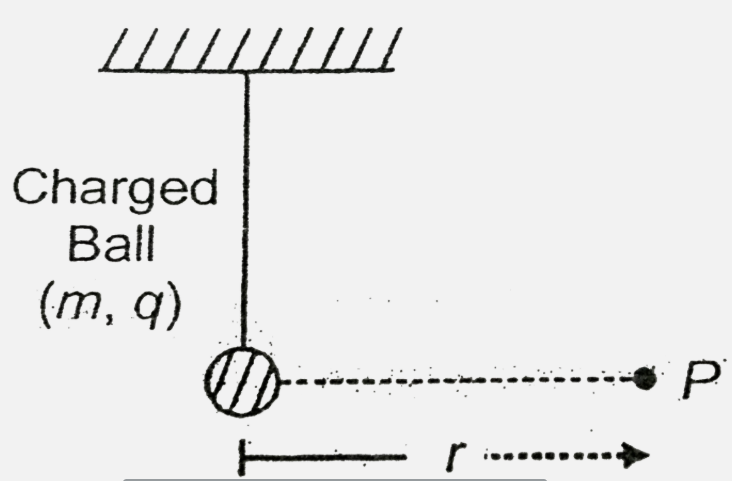The vector form of Coulomb's law is (A) →F=14πε0⋅q1q2|→r|3→r (B) →F=14πε0⋅q1q2|→r|3 (C) →F=14πε0⋅q1q2r2→r (D) →F=14πε0⋅q1q2r→r
Step by step video solution for The vector form of Coulomb's law is (A) vec F=(1)/(4 pi epsilon_(0))*(q_(1)q_(2))/(|vec r|^(3))vec r (B) vec F=(1)/(4 pi epsilon_(0))*(q_(1)q_(2))/(|vec r|^(3)) (C) vec F=(1)/(4 pi epsilon_(0))*(q_(1)q_(2))/(r^(2))vec r (D) vec F=(1)/(4 pi epsilon_(0))*(q_(1)q_(2))/(r)vec r by Physics experts to help you in doubts & scoring excellent marks in Class 11 exams.
Updated on:21/07/2023Similar Questions
The vector form of Coulomb's law is (A) →F=14πε0⋅q1q2|→r|3→r (B) →F=14πε0⋅q1q2r3 (C) →F=14πε0⋅q1q2r2→r (D) →F=14πε0⋅q1q2r→r
View Solution[" Two uniformly charged non "],[" conducting spheres of radii "R_(1)" and "],[R_(2)" having charges "Q_(1)" and "Q_(2)],[" respectively are seperated by "],[" distance "r" .Total electrostatic "],[" energy of this system is "],[qquad [U=(1)/(4 pi epsilon_(0)){(3Q_(1)^(2))/(5R_(1))+(3Q_(2)^(2))/(5R_(2))+(Q_(1)Q_(2))/(r)}],[U=(1)/(4 pi epsilon_(0)){(3Q_(1)^(2))/(5R_(1))+(3Q_(2)^(2))/(5R_(2))-(Q_(1)Q_(2))/(r)}],[U=(1)/(4 pi epsilon_(0)){(Q_(1)^(2))/(5R_(1))+(3Q_(2)^(2))/(5R_(2))-(Q_(1)Q_(2))/(r)}],[U=(1)/(4 pi epsilon_(0)){(3Q_(1)^(2))/(5R_(1))+(3Q_(2)^(2))/(R_(2))+(Q_(1)Q_(2))/(r)}]]
View Solution
Knowledge Check
The Bohr model for the H-atom relies on the Coulomb's law of electrostatics . Coulomb's law has not directly been varified for very short distances of the order of angstroms. Suppos-ing Coulomb's law between two oppsite charge +q1,−q2 is modified to ∣∣→F∣∣=q1q2(4πε0)r21r2,r≥R0
=q1q2(4πε0)r21R20(R0r)ε,r≤R0
Calculate in such a case , the ground state enenergy of H-atom , if ε0.1,R0=1ÅA−11.4eVB−7.9eVC−13.1eVD−15.2eVif →P×→R=→Q×→R, then
A→P=→QB→P and →Q need not be equalCThere are infinite number of possibilities for →P (If →Q and →R are given ) which satisfy this relationship.D→p and →Q must be coplanar
41.Self energy of conducting sphere of radius r carrying charge is (1) Q28πε0(r) (2) Q24πε0(r) (3) Q26πε0(r) (4) Q22πε0(r)
View SolutionThe Bohr model for the H-atom relies on the Coulomb's law of electrostatics . Coulomb's law has not directly been varified for very short distances of the order of angstroms. Suppos-ing Coulomb's law between two oppsite charge +q1,−q2 is modified to ∣∣→F∣∣=q1q2(4πε0)r21r2,r≥R0
=q1q2(4πε0)r21R20(R0r)ε,r≤R0
Calculate in such a case , the ground state enenergy of H-atom , if ε=0.1,R0=1Å
View SolutionThere are three charges Q1 columb Q2 columb and Q3 columb. Q2 and Q3 are fixed at positive (0,0) and (30,0) respectively.Now Q1 moves in circular path in x−y plane of radius 40m with help of external agent starting from (0,40) about origin then work done by external agent is till Q1 crosses x axis (40,0) given co-ordinates are in centimeters: (1) Q1Q34πε0 joule (2) Q1Q32πε0 joule (3) 2Q1Q3πε0joule (4) 2Q1(Q2+Q3)πε0 joule
View SolutionThere are three charges Q1 columb Q2 columb and Q3 columb. Q2 and Q3 are fixed at positive (0 0) and (30 0) respectively.Now Q1 moves in circular path in x -y plane of radius 40 cm with help of external agent starting from (0 40) about origin then work done by external agent is till Q1 crosses x axis (40 0) given co-ordinates are in centimeters: 1) Q1Q34πε0 joule 2) Q1Q32πε0 joule 3) 2Q1Q3πε0 joule 4) 2Q1(Q2+Q3)πε0 joule
View SolutionIf →r=3→p+4→q and 2→r=→p−3→q then
View SolutionThe electric field at point P due to a charged ball is given by
Ep=14πε0qr2
To measure 'E' at point P, A test charge q0 is placed at point P and measure electric force F upon the test charge. Check whether Fq0 is equal to 14πε0qr2 or not .

View Solution